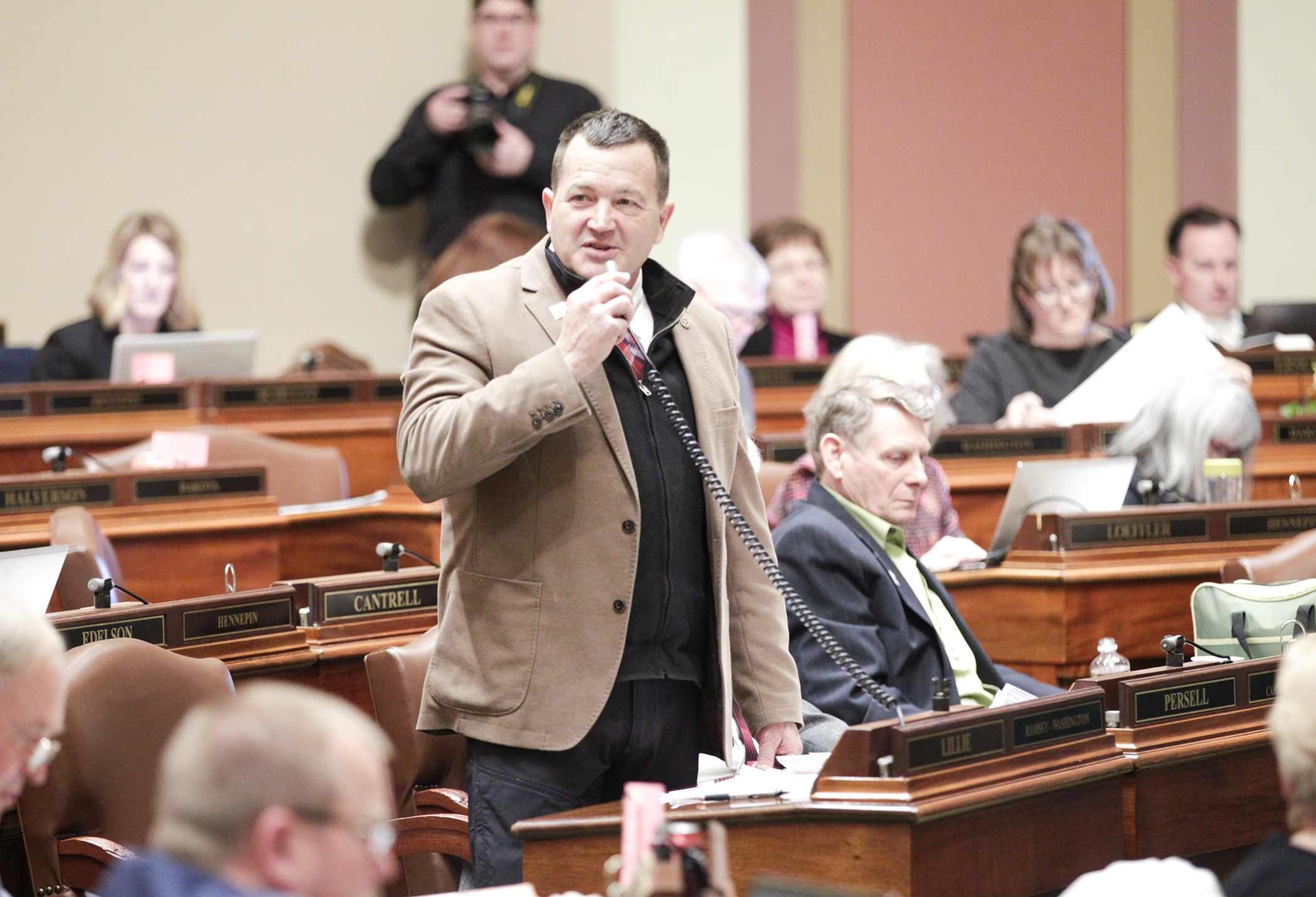After heated debate about arts funding, House passes omnibus legacy bill

A three-plus-hour debate that laid bare controversies about funding for the arts, land acquisition and some clean water projects concluded with the House overwhelmingly approving the omnibus legacy bill, which would allocate $629.98 million of the state’s sales tax revenue to clean water, outdoor heritage, parks and trails, and arts and cultural heritage.
Sponsored by the House Legacy Finance Division’s chair, Rep. Leon Lillie (DFL-North St. Paul), HF653, as amended, was passed by a 100-26 vote. It now goes to the Senate where Sen. Carrie Ruud (R-Breezy Point) is the sponsor.
Its dollars come from the constitutionally dedicated funding source established when Minnesota voters approved the Legacy Amendment in 2008. The bill is very close to what was approved by the finance division April 10.
The House bill would distribute money to the four constitutionally mandated funds thus:
- $261.26 million from the Clean Water Fund;
- $139.77 million from the Arts and Cultural Heritage Fund;
- $127.69 million from the Outdoor Heritage Fund; and
- $101.26 million from the Parks and Trails Fund.
Funding would be for the 2020-21 biennium, save for the Outdoor Heritage Fund, which receives its 33 percent of the Legacy funds on an annual basis, based upon recommendations of the Lessard-Sams Outdoor Heritage Council.
The Clean Water Fund and the Outdoor Heritage Fund each receive 33 percent of Legacy funds, while the Arts and Cultural Heritage Fund receives 19.75 percent and the Parks and Trails Fund 14.25 percent.
“With this amendment, we are the envy of the country,” Lillie said. “Over 18,000 projects have been funded in the Legacy Amendment’s 10 years.”
In addition to a marked increase in the use of parks and trails, Lillie touted the Arts and Cultural Heritage Fund’s appropriations for history and children’s museums, zoos, public radio and television, and county fairs.
Six amendments to the bill were brought to the floor, with two adopted. One would add detail to a pair of projects under the Arts and Cultural Heritage Fund: Stipulating how the local Hmong community would be involved in St. Paul’s Phalen Park China Garden and altering language for Somali community cultural grants.
The most vigorous debate was related to an amendment introduced by Rep. Steve Green (R-Fosston) that would restrict the scope of projects funded by the Arts and Cultural Heritage Fund, including not funding “projects that promote domestic terrorism or criminal activities,” with a civil penalty for violations of up to 10 times the funding a project receives.
After language was added that would expand the prohibition against the promotion of domestic terrorism to include “white nationalism; crimes motivated by bias including promoting violence or threats of harm on the basis of race, gender, religion or sexual orientation,” the amendment was adopted 73-48.
Among amendments defeated were two offered by Green that would have transferred money from the Minnesota State Arts Board’s allocation for other purposes. One would have earmarked $100,000 to promote “skilled trades,” while a more controversial measure would have re-allocated $350,000 for the collection and archiving of stories of the Vietnam War-era experiences of Asians who immigrated to Minnesota. While Green argued it important to make a documentary film about the subject, Lillie and two legislators of Hmong descent voiced concern that there wasn’t great enough diversity of voices in the proposal.
Another defeated amendment dealt with Clean Water Fund allocations. Offered by Rep. Jeff Backer (R-Browns Valley), it would have reduced funding for the Department of Agriculture’s Forever Green agricultural initiative and transferred much of it to a “Drainage Working Group.” It was defeated by a split voice vote, as was an amendment to the amendment that would have increased base funding for soil and water conservation districts, which some DFL legislators argued is an inappropriate use of the Clean Water Fund.
An amendment that would have earmarked $40,000 of the Minnesota Historical Society’s funding for a particular Isanti County Historical Society project was withdrawn.
Several Republicans spoke in favor of the bill, most saying that its benefits far outweigh its flaws.
“There’s never been a perfect legacy bill,” said Rep. Dean Urdahl (R-Grove City), “but this one is pretty close.”
Rep. Mary Murphy (DFL-Hermantown) gave an impassioned plea for passage, calling it “a bill that brings Minnesotans together.”
Related Articles
Search Session Daily
Advanced Search OptionsPriority Dailies
Ways and Means Committee OKs proposed $512 million supplemental budget on party-line vote
By Mike Cook Meeting more needs or fiscal irresponsibility is one way to sum up the differences among the two parties on a supplemental spending package a year after a $72 billion state budg...
Meeting more needs or fiscal irresponsibility is one way to sum up the differences among the two parties on a supplemental spending package a year after a $72 billion state budg...
Minnesota’s projected budget surplus balloons to $3.7 billion, but fiscal pressure still looms
By Rob Hubbard Just as Minnesota has experienced a warmer winter than usual, so has the state’s budget outlook warmed over the past few months.
On Thursday, Minnesota Management and Budget...
Just as Minnesota has experienced a warmer winter than usual, so has the state’s budget outlook warmed over the past few months.
On Thursday, Minnesota Management and Budget...